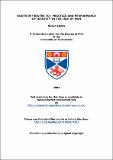Files in this item
Roots of/routes to : practice and performance of identity in the Isle of Man
Item metadata
| dc.contributor.advisor | Rapport, Nigel | |
| dc.contributor.author | Lewis, Susan | |
| dc.coverage.spatial | 304 p. | en_US |
| dc.date.accessioned | 2015-08-21T10:31:58Z | |
| dc.date.available | 2015-08-21T10:31:58Z | |
| dc.date.issued | 2004 | |
| dc.identifier | uk.bl.ethos.546710 | |
| dc.identifier.uri | https://hdl.handle.net/10023/7297 | |
| dc.description.abstract | This thesis takes as its ethnographic focus the Isle of Man, a British Crown Dependency. In the 1960s, the Manx government faced an economic crisis. The response was to open the Island to international banking, becoming an 'offshore' financial centre. The new industry sector has encouraged substantial immigration, to the extent that the Island-born are now in the minority. The Island now has economic success on one hand, but a new 'identity' crisis of cultural confidence on the other, raising the question 'what is it (now), to be Manx?' The Manx have always accepted incomers and are not, or ever have been, a clearly defined ethnic group. Rather 'Manxness' is an idea, a set of values, a way of relating to place and to each other. Defined thus, 'Manx identity' could be, and has been, shared with incomers. The current situation is, however, perceived as substantially different in its speed and volume, resulting in concerns that Manx culture and identity is disappearing under the weight of an alien cultural import. Reaction is demonstrated in renewed interest in the Manx Gaelic language and other 'traditiona1' pursuits, with individuals selecting routes to identification with place that satisfy personal motivations. Included in this performance of culture are members of the 'incomer' group blamed for its demise, while many Island-born show little concern. Through subtle analysis of this complex context, I add to anthropological understanding of 'identity' and 'way of life' by juxtaposing personal and collective responses to this process of change, and investigating the importance of scales of difference. And, in a disciplinary context that has shifted attention from bounded to boundless 'homes', I ask how far anthropological constructions go in explicating how and why our informants still struggle to strike a meaningful balance between their roots of and routes to identity | en_US |
| dc.language.iso | en | en_US |
| dc.publisher | University of St Andrews | |
| dc.subject.lcc | GN17.3I76L4 | |
| dc.subject.lcsh | Ethnology -- Isle of Man. | en_US |
| dc.title | Roots of/routes to : practice and performance of identity in the Isle of Man | en_US |
| dc.type | Thesis | en_US |
| dc.accrualMethod | Isle of Man -- Social life and customs. | en_US |
| dc.type.qualificationlevel | Doctoral | en_US |
| dc.type.qualificationname | PhD Doctor of Philosophy | en_US |
| dc.publisher.institution | The University of St Andrews | en_US |
This item appears in the following Collection(s)
Items in the St Andrews Research Repository are protected by copyright, with all rights reserved, unless otherwise indicated.

